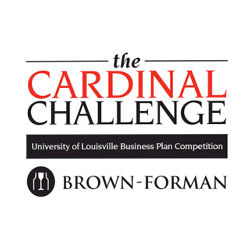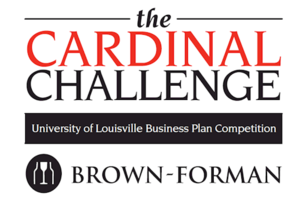
Graduate students from the University of Notre Dame competed as the group Certus Therapeutics, Inc. (Certus) in the 2016 Brown-Forman Cardinal Challenge at the University of Louisville on February 13, 2016. The competition showcases new business concepts presented by MBA and graduate students from “12 of the world’s leading entrepreneurship programs."

Members of Certus include:
• Brittany Butler, M.S. in the Patent Law program, Ph.D. Biomedical Sciences
• Sean Panchal, Mendoza College of Business Executive M.B.A. program
• Charissa Quinlan, Ph.D., Integrated Biomedical Sciences
• Michael Schneider, Mendoza College of Business M.S.A. program
• Kevin Schneider, Mendoza College of Business M.S.A. program
• Rebecca Shute, ESTEEM program
The team presented a business plan for a novel liposome product called Lypos™, which is a nanoparticle drug delivery platform with the potential to target cancer cells, lessen the toxic effect of cancer medications, and increase a patient’s quality of life.
Liposomes are spherical, bubble-like particles made from a phospholipid bilayer – the same molecules that comprise cell membranes. The liposomes developed by lead inventor Basar Bilgicer, Associate Professor in the Department of Chemical and Biomolecular Engineering, are more consistent compared to previous liposomes due to the technique used to create the nanoparticles. Bilgicer’s innovative format allows the components of Lypos™ to be carefully incorporated during liposome synthesis and, in turn, drastically increases uniformity.
Speaking about his research, Bilgicer explained, “Liposomal nanoparticles work by penetrating the gaps that the vasculature around the tumor tissue has, delivering cancer medication selectively to the cancer cells, and leaving healthy tissue unharmed.”
“In addition to this selective delivery to a tumor,” said Bilgicer, “liposomal nanoparticles also include targeting molecules and stealth coating in their design for more efficient tumor targeting, while staying undetectable to the body’s natural defense mechanism, the immune system. These design features further increase the ability for the nanoparticles to deliver cancer treatments effectively and improve overall patient outcome.”
Certus is advised by Gaylene Anderson, Senior Innovation Officer for the Cleveland Clinic and Tech Transfer at Notre Dame, where she manages life science inventions that can be used in the healthcare industry. In her role at the University, she discusses potential patents with inventors as well as the best commercialization route for an invention.
In a circumstance where an invention can be a platform for a business venture and an inventor is supportive of the idea, Anderson finds the top entrepreneurial graduate students from a variety of majors to develop a business plan and participate in competitions around the country. These competitions allow business ventures to receive increased visibility from prospective stakeholders while graduate students learn how to create a pitch for investors and generate a start-up company.
To learn more about Certus Therapeutics, Inc. follow them on Twitter @Certus_Lypos or visit ott.nd.edu to learn more about Tech Transfer at the University of Notre Dame.
Contact
Brandi R. Klingerman / Communications Specialist
Notre Dame Research / University of Notre Dame
bklinger@nd.edu / 574.631.8183
About Notre Dame Research:
The University of Notre Dame is a private research and teaching university inspired by its Catholic mission. Located in South Bend, Indiana, its researchers are advancing human understanding through research, scholarship, education, and creative endeavor in order to be a repository for knowledge and a powerful means for doing good in the world. For more information, please see research.nd.edu or @UNDResearch.